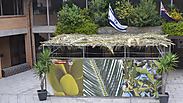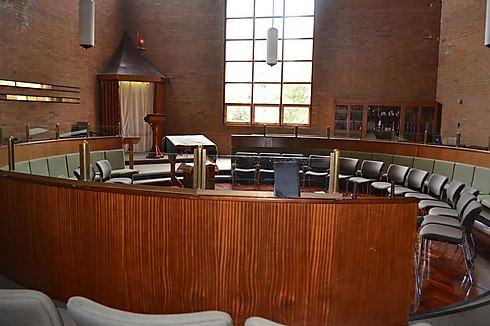
Closer than Mars: The world's most distant Jewish community
Auckland, New Zealand, home to 3,000 Jews, is where kippa-clad Catholic boys keep the city's only Jewish school alive, and a mohel is flown from Australia every time a baby boy is born.
On the edge of the world lives small community of Jews - who manage to maintain an Orthodox lifestyle in the face of some pretty big challenges. Auckland, in New Zealand, is home to a 3,000-strong Jewish community.
This small community might be slightly too large for my PhD thesis, which deals with Jewish communities numbering fewer than 1,000 individuals, but its unique geographical location opened a "door," if you will, for me. My project has two central purposes: To prevent the extinction of these tiny communities and to increase cooperation between large and small Jewish communities.
Auckland's Jewish community is largely Orthodox in nature. It is also very welcoming, allowing both individuals and the community at large to express their beliefs freely. An interesting example of the community's openness is the fact that its has a woman as its leader, a role typically reserved for men.
Auckland is also home to a small Reform community, living peacefully alongside and cooperating with the Orthodox community. This is another example of the community’s atypical tolerance, if you will.
Catholics with kippas
There were two private Jewish schools in Auckland in the not so distant past - Moriah and Kadima. However, Moriah was recently closed due to a lack of resources. Kadima is an elementary school, and as of now there is no Jewish high school in Auckland.
Nearly 180 children go to Kadima, but the school has recently become public, and as such receives subsidies from the state. As a result the school must accept non-Jews as well as Jews.
This phenomenon is well-known in other Jewish communities, but in contrast to them, all students at Kadima must wear a kippah in Hebrew classes, and must take part in morning prayers.
The non-Jewish students also use the so-called "Hebrew room," where the Israeli teacher answers the pupils' question and helps students borrow Hebrew books. The school’s principal says that she has to deal with the lack of certified teachers on a daily basis (calling on all the Hebrew teacher reading this article...)
So the youth doesn’t lose its heritage
The synagogue is in the same building as Kadima, and is divided into two parts: The "small" synagogue - where the students hold their morning prayers, while the "big" and more luxurious synagogue services the community at large on holidays and for special events.
Adjacent to the large synagogue is a banquet hall, where most of the community events are held.
Auckland has another Synagogue named the "Shtable", which is located a few minutes away from Kadima.
The 3,000-strong communitiy also includes some Israelis who moved to Auckland for business. Guy arrived in Auckland with his wife and children as an envoy for the Jewish National Fund, Habonim-Dror and the World Zionist Organization. His wife serves as an envoy for the Jewish Agency. They work with the Bnei Akiva envoys, in order to help the community's youth in every way possible, including connecting them to their Judaism and Zionism.
The city has only one kosher grocer, and it is quite small and expensive, while also serving as a quaint deli restaurant, and the kosher catering source for flights departing from New Zealand.
Kosher stores tend to be more expensive around the world due to the scarcity of kosher butchers, but this isn’t the case in Auckland. Fulmos kosher butchers managed to make headlines around the country, and even reached the Supreme Court, following green groups' opposition to kosher slaughter.
In the end, the two sides reached a settlement in which Jews can conduct kosher slaughter only twice a year, generally during the holidays or Rosh Hashanah and Passover.
New Zealand’s government also maintains strict policy on the issue of circumcision. A mohel can only conduct a circumcision if he is a certified doctor. Members of the community are thus forced to fly in a mohel from Australia, while bringing in a certified New Zealand doctor to oversee the process, which makes the process quite difficult and expensive.
The figures are even more surprising considering that New Zealand's own Prime Minister, John Kay, is a Jew. His mother is a Jew, but he himself does not identify as a Jew, and is married to a Christian.











